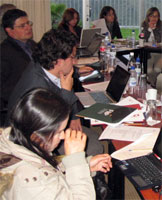Improving freedom of expression monitoring in Andean region
31-12-2010 (Quito)

GALI meeting in Quito
© UNESCO
The Center for Studies on Freedom of Expression and Access to Information (CELE) of the University of Palermo (Argentina) and the UNESCO Office in Quito organized a meeting of organizations of the Andean Group of Freedom of Information (GALI) in order to evaluate the mechanisms being currently used to monitor violations of freedom of expression in the region.
The meeting, which was held in November 2010 in Quito (Ecuador), explored how new technology platforms may improve freedom of expression monitoring mechanisms, in particular the scope and accuracy of the registration processes, the dissemination of alerts, and the indicators and statistics produced by the monitoring system.
This activity was organized within the framework of the International Programme for the Development of Communication (IPDC) regional project, Strengthening Monitoring of Freedom of Expression in the Andean Region. As a first result of the project, the GALI member organizations widened the scope of the issues, covered by the freedom of expression monitoring mechanism, in order to include the following:
legal and administrative processes against journalists,
mandatory dissemination of governmental content,
sudden withdrawal of public advertising, and
arbitrary cancellation of radio and television licenses.
Moreover, GALI identified the need to evaluate the freedom of expression legislation prevailing in each country in order to identify its strengths and weaknesses. For this purpose, the implementation of UNESCO’s Media Development Indicators, particularly the category 1, was proposed to the Group. This instrument can contribute to assessing, in a precise manner, whether national legislation on freedom of expression and access to information meets international standards.
CELE will initially monitor the collection of data on these new issues until June 2011. In July 2011 there will be a second meeting of the GALI organizations in order to assess progress and problems encountered during that period. The scope of the new monitoring system will then be finally decided, as well as the strategies to be implemented to improve the current mechanisms.
This activity was organized within the framework of the International Programme for the Development of Communication (IPDC) regional project, Strengthening Monitoring of Freedom of Expression in the Andean Region. As a first result of the project, the GALI member organizations widened the scope of the issues, covered by the freedom of expression monitoring mechanism, in order to include the following:
Moreover, GALI identified the need to evaluate the freedom of expression legislation prevailing in each country in order to identify its strengths and weaknesses. For this purpose, the implementation of UNESCO’s Media Development Indicators, particularly the category 1, was proposed to the Group. This instrument can contribute to assessing, in a precise manner, whether national legislation on freedom of expression and access to information meets international standards.
CELE will initially monitor the collection of data on these new issues until June 2011. In July 2011 there will be a second meeting of the GALI organizations in order to assess progress and problems encountered during that period. The scope of the new monitoring system will then be finally decided, as well as the strategies to be implemented to improve the current mechanisms.
GALI organizations:
Fundamedios, Ecuador
National Press Asociation (Asociación Nacional de la Prensa, ANP), Bolivia
Press and Society Institute (Instituto Prensa y Sociedad, IPYS), Colombia
Press and Society Institute (Instituto Prensa y Sociedad, IPYS), Perú
Press and Society Institute (Instituto Prensa y Sociedad, IPYS), Venezuela The Foundation for Press Freedom (Fundación para la Libertad de Prensa, FLIP), Colombia, does not belong to GALI but was a special guest at the meeting, since it monitors freedom of expression in Colombia.
Related themes/countries
· Latin America/Caribbean
· Freedom of Expression
· Weekly newsletter
Share this story:
Contact information
- UNESCO
Source
- UNESCO Office in Quito (in Spanish)
Field office














